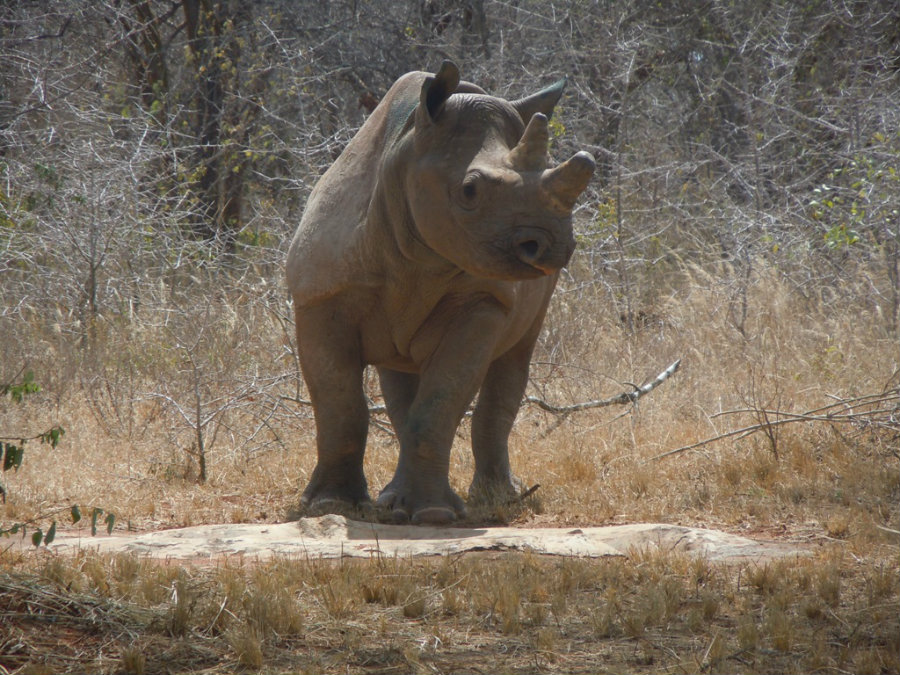Grumeti and Zawadi, two female eastern black rhinos bred in captivity in England, gave birth in the wild in Africa four years after being released near Mount Kilimanjaro, Tanzania. The Aspirational Foundation, responsible for protecting these critically endangered species, announced Sunday that the two females mated Jamie, a male who had been born in captivity in the Czech Republic before conservationists relocated him to his ancestral homeland.
After saying goodbye to Aspinall Foundation’s Port Lympne wildlife park in Kent, Zawadi and Grumeti traveled back to Tanzania via plane, boat, and truck. After 15-month pregnancies, each of the 2,200- pound rhinos was able to give birth to healthy 17-pound babies.

Grumeti’s baby was born first, and Mobo is his name. Zwandi’s calf has not been named yet. The newborns have a life expectancy of 50, and experts estimate they will stay with their moms for up to five years.
“These births represent a remarkable and vital breakthrough in the Aspinall Foundation’s efforts to protect this critically endangered species,” expressed foundation’s chairman Damian Aspinall, as quoted by The Telegraph.
Aspinall explained that the best way to take care of this nearly extinct species is to combine reintroduction with “robust protection” in order to help conserve the habitat and achieve repopulation. He was proud to affirm that modern conservation defined the decades-long efforts by the Aspinall Foundation.
The organization said thirty-six eastern black rhinos have been born at Port Lympne and conservationists are expecting two more in the coming weeks, according to The Telegraph. Eight have been relocated to Africa so far as part of the Back to the Wild program.
The new moms had received a Royal send-off in 2012
Prince William had the opportunity to give Grumeti and Zawadi a very special send-off when they left England in 2012. The Duke of Cambridge and his brother Prince Harry have been engaged in efforts to protect wildlife in Africa.
“It’s great to hear the news,” the Duke told the Daily Mail on Sunday. “It is incredibly difficult to get rhinos that have previously been in captivity to breed in the wild, so huge congratulations to the team that made this happen.”
William noted that this success story served as a reminder that committed conservationists can achieve a lot in spite of the terrible circumstances endangered animals are going through.
To date, conservationists estimate there are only 700 of eastern black rhinos in the wild as a consequence of a poaching crisis. Poachers are increasingly seeking rhino horn motivated by its healing characteristics and use as a status symbol. Only in 2015, poachers killed 1,338 individuals of this rhino sub-species.
Other endangered species in Africa
Africa’s wildlife is incredibly rich but human activity constantly threatens a wide variety of species. In the Congo Basin, poaching is also a growing problem that affects animals even within protected areas. In addition to rhinos, threatened species include mountain gorillas, which only exist in a pair of isolated regions in central Africa, according to the World Wildlife Organization.
In Madagascar, a lemur known as the Silky Sifaka (angel of the forest) is considered a critically endangered species. It is one of the rarest mammals found in this planet. The rare Ploughshare tortoise is also threatened due to illegal trade on exotic pet markets. One of them can be sold for as much as $200,000 and only about 1,000 are left in Madagascar.
The Greater Bamboo Lemur, according to The Aspinall Foundation, is the most threatened of all lemur species, also endemic to Madagascar. Conservationists estimate that there are under 1,000 individuals and only 20 in captivity. However, the numbers have been lower than that- The organization has helped remove the greater bamboo lemur from the top 25 of the world’s most endangered primates, as the foundation reports on its website.
Source: The Washington Post

Absolutely great, heart-warming news. So very happy – and there are two more to come 🙂 YAY!! Robust protection is indeed needed to help protect these ones from extinction.